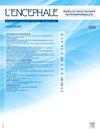老年精神病住院患者服用精神药物 PIP 的相关性如何?
IF 1
4区 医学
Q4 NEUROSCIENCES
Encephale-Revue De Psychiatrie Clinique Biologique et Therapeutique
Pub Date : 2025-06-01
DOI:10.1016/j.encep.2024.04.005
引用次数: 0
摘要
目的:2019 年,对老年精神病住院患者精神药物潜在不当处方(PIP)进行了一次地区性调查,强调了这些药物在这一人群中的不当使用。本研究的目的是评估这些根据现行既定标准被认为不适当的处方的临床相关性--其定义为提供适当且必要的治疗,并从其他替代方案中选出最有可能为特定患者产生预期效果的方案:根据 STOPP/STARTv2 标准和住院 48 小时后处方上的 Laroche 清单建立的审计网格确定了至少一种精神药物或抗胆碱能药物 PIP 的 75 岁以上或 64 至 75 岁的多病理患者。药剂师和精神科医生根据当前病程的全部电脑记录,对处方的不适宜性(治疗抵抗、危机期、合并症......)进行权衡。PIP和整个处方的临床相关性被评为0(不相关)、1(部分相关)或2(相关):结果:共纳入 34 名患者。结果:共纳入 34 名患者,发现 125 个精神药物 PIP:50.4%涉及苯二氮卓和非苯二氮卓抗焦虑药(BZD/Z),25.6%涉及神经安定药(NL),12%涉及抗抑郁药(ATD),12%涉及抗胆碱能药物。一方面,49.2% 的 BZD/Z PIP、50% 的 NL PIP 和 20% 的 ATD PIP 被认为与药物无关。另一方面,49.2% 的 BZD/Z PIP、31.3% 的 NL PIP 和 13.3% 的 ATD PIP 被认为部分相关。此外,1.6%的 BZD/Z PIP、18.8%的 NL PIP 和 66.7%的 ATD PIP 被认为相关。至于抗胆碱能负荷高的药物的PIP,80%被认为不相关,13.3%部分相关,6.7%相关。总之,在研究的 34 个药物处方中,3 个(8.8%)被认为不相关,11 个(32.4%)部分相关,20 个(58.8%)临床相关:这项研究强调,根据目前的 PPI 标准,半数以上被认为不适合老年人的处方药具有临床相关性。它强调了一种新的 PPI 检测工具对患有精神疾病的老年患者的重要性。本文章由计算机程序翻译,如有差异,请以英文原文为准。
What about the relevance of PIP of psychotropics in older psychiatric inpatients?
Objective
In 2019, a regional survey of potentially inappropriate prescriptions (PIP) of psychotropic drugs in elderly psychiatric inpatients was carried out highlighting their inappropriate use in this population. The aim of this study was to assess the clinical relevance – defined as the provision of an appropriate and necessary treatment, chosen from other alternatives as being the most likely to produce the expected results for a given patient – of these prescriptions considered inappropriate according to current established criteria.
Material and method
Patients aged over 75, or 64 to 75 and polypathological with at least one PIP of psychotropic drugs or drugs with a high anticholinergic burden, identified by an audit grid established on the basis of STOPP/STARTv2 criteria and the Laroche list on the prescription at 48 h of hospitalization, were included. The weighing of the inappropriateness nature of the prescription (resistance to treatment, period of crisis, comorbidities…) was established by a pharmacist-psychiatrist pair on the entire computerized record of the current episode. The clinical relevance of the PIP and the overall prescription was rated as 0 (irrelevant), 1 (partially relevant) or 2 (relevant).
Results
Thirty-four patients were included. One hundred and twenty-five PIP of psychotropic drugs were noted: 50.4% concerned benzodiazepines and non-benzodiazepines anxiolytics (BZD/Z), 25.6% neuroleptics (NL), 12% antidepressants (ATD) and 12% drugs with a high anticholinergic burden. On one hand, 49.2% of PIP of BZD/Z, 50% of PIP of NL and 20% of PIP of ATD were considered irrelevant. On the other hand, 49.2% of PIP of BZD/Z, 31.3% of PIP of NL and 13.3% of PIP of ATD were considered partially relevant. Furthermore, 1.6% of PIP of BZD/Z, 18.8% of PIP of NL and 66.7% of PIP of ATD were considered relevant. For PIPs of drugs with a high anticholinergic burden, 80% were deemed irrelevant, 13.3% partially relevant and 6.7% relevant. In all, of the 34 drug prescriptions studied, three (8.8%) were considered irrelevant, 11 (32.4%) partially relevant and 20 (58.8%) clinically relevant.
Conclusion
This study highlighted the clinical relevance of more than half the prescriptions considered inappropriate according to current PPI criteria in the elderly. It underlines the interest of a new PPI detection tool for elderly patients with psychiatric disorders.
求助全文
通过发布文献求助,成功后即可免费获取论文全文。
去求助
来源期刊
CiteScore
4.60
自引率
7.40%
发文量
162
审稿时长
6-12 weeks
期刊介绍:
Une revue française de renommée internationale.
- Un comite de rédaction représentant tous les aspects de la prise en charge psychiatrique du patient.
- Une sélection rigoureuse d''articles faisant l''objet de plusieurs expertises.
- Des travaux d''auteurs et de chercheurs de renommée internationale.
- Des indexations dans les grandes bases de données (Current Contents, Excerpta Medica, etc.).
- Un facteur d''impact qui témoigne de la grande notoriété de la revue.
La tribune des publications originales de haut niveau.
- Une très grande diversité des sujets traités, rigoureusement sélectionnés à travers des sommaires dynamiques :
- des éditoriaux de médecins référents,
- une revue de presse sur les actualités internationales,
- des articles originaux pour approfondir vos connaissances,
- des mises au point et des cas cliniques pour engager votre réflexion sur les indications et choix possibles au travers de mises en situation clinique,
- des dossiers thématiques pour faire le tour d''une question.
- L''actualité de l''AFPB : L''Encéphale publie régulièrement des comptes rendus de l''Association française de psychiatrie clinique.

 求助内容:
求助内容: 应助结果提醒方式:
应助结果提醒方式:


